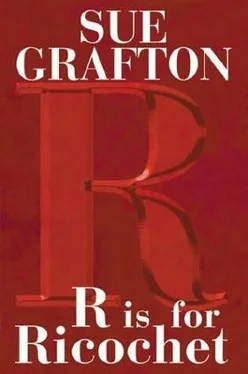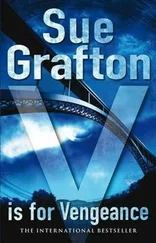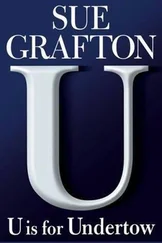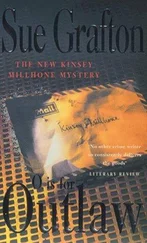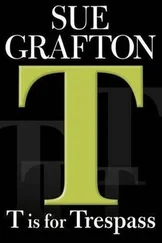"I left that at home. I also have a six-year-old Ford pickup that I use for surveillance. I took delivery on this baby in Los Angeles last week."
"Slick."
He turned right at the corner and headed across town. I liked his driving style. No speeding, no showing off, and no reckless moves. Out of the corner of my eye, I noted the matte finish on his red silk windbreaker – nothing shiny or vulgar – white dress shirt, the chinos, snappy Italian shoes that probably cost more than my monthly rent. Even in an open car, his aftershave smelled like spices, the scent of tiny blossoms on some night-blooming shrub. This was pitiful. I wanted to lean over and sniff deeply at the side of his face. He glanced at me, smiling, as though he knew what was going on in my head. This was not a good sign.
Santa Teresa has never been noted for its club scene or its wild nightlife. Most restaurants close soon after the last of the dinner orders have been plated and served. The bars are open until 2:00 A.M., but most don't provide dance floors or live music. Jay's Cocktail Lounge, downtown, is one of the few spots to offer both. In addition, from 11:30 A.M. until 2:00 P.M., lunch is served to a limited clientele who prefer the privacy and quiet for low-key business meetings and discreet liaisons. The walls are padded in gray suede, with a thick gray carpet underfoot that makes you feel you're walking across a mattress. Even by day, the place is so dark, you have to pause at the entrance until your eyes adjust. The booths are commodious, padded in black leather, and any ambient noise is dampened to a hush. Cheney gave his name to the hostess – Phillips, party of three.
He'd made reservations in advance.
I said, "God, you're cocky. What made you so sure I'd say yes?"
"I've never known you to turn down food, especially if someone else pays. Must feel like mothering."
"Well, it is, isn't it?"
"By the way, Vince called to say he's running late. He said to go ahead and order."
We spent the first part of the meal dealing with matters unrelated to Reba Lafferty. We sipped iced tea and picked at our sandwiches, unusual for me where food is concerned. I'm accustomed to eating fast and moaning aloud, but Cheney seemed to enjoy taking his sweet time. We chatted about his career and mine, the police department budget cuts, and the effects thereof. We knew a few cops in common, one being Jonah Robb, the married man I "dated" during one of his frequent separations from his wife, Camilla.
I said, "How's Jonah doing these days? Is the marriage off again or on?" I rattled the last of the ice cubes in my empty glass and, as if on cue, the busboy appeared to replenish my supply.
Cheney said, "Off, from what I hear. They had a kid. I should say, Camilla did. According to the scuttlebutt, the boy wasn't his."
"Yeah, but he's crazy about that baby all the same," I said. "I ran into him a couple of months ago and he was busting his buttons he was so proud of the kid."
"What about the two daughters? No telling what effect this is having on them."
"Camilla doesn't seem to care. I wish they'd just get back together and be done with it. How many times have they split?"
Cheney shook his head.
I studied him. "What about you? How's married life these days?"
"That's over."
"Over?"
"You know the word 'over'? As in done with."
"I'm sorry to hear that. When did this transpire?"
"Middle of May. Embarrassing to admit, but we were only married five weeks, which is one week less than we'd known each other before we eloped."
"Where is she now?"
"She's moved back to L.A."
"That was quick."
"Like ripping off a Band-Aid. Better to get it over with."
"Did you learn anything?"
"I doubt it. I was tired of feeling dead. Work we do, we take chances in the real world but not so much in here," he said, tapping on his chest. "What's love about if not risk?"
I studied my plate, which was littered with potato chip crumbs. I licked my index finger and captured a cluster that I laid on my tongue. "You're beyond my area of competence. These days, I seem to be surrounded by people who've got it wrong, Reba Lafferty being one."
He leaned forward, elbows on the table, holding his glass by the rim. "So let's talk about her."
"What's to talk about? She's fragile. It doesn't seem right to put the squeeze on her."
A flicker of irritation crossed his face. "Fragile, my ass. She's the one who elected to get involved with him. Turns out, he's a sleazebag in more ways than one. She should know what's going on."
"You're not doing this for her sake. You're doing it for yours."
"What difference does that make? She needs to be told. Or do you disagree?"
"What if the revelation pushes her over the edge?"
"If she goes off the deep end, we'll handle it." His gaze shifted to a point just over my shoulder. I turned my head and caught a glimpse of a man I assumed was Vince Turner approaching to my left. Cheney slid out of the booth and the two of them shook hands.
Vince Turner was a hefty man in his forties, round-faced, balding, wearing a tan raincoat. The wire stems on his frameless glasses had been bent at an angle that left them slightly askew. He toted a brown leather school bag that in sixth grade would have labeled him as hopelessly out of it. Now the scuffed handle and the buckles on the two exterior pockets marked him as self-assured.
Cheney introduced us. Turner peeled off his raincoat and tossed it across the back of the banquette before he sat down. His suit was mud brown, the jacket wrinkled across the back. His trousers had accordion pleats radiating from the crotch because he'd sat in them too long. He loosened his tie and tucked the ends in the pocket of his dress shirt, perhaps to keep them from flapping in his food.
"Have you eaten?" Cheney asked.
"I had a burger in the car coming up, but I could use a drink."
Cheney signaled the waiter, who appeared moments later with a menu in hand.
Turner waved it away. "Maker's on the rocks. A double."
"Would you like anything else?"
"That's fine. What about you, Cheney?"
"I'm good."
"By me," I said.
As soon as the waiter disappeared, Turner picked up his baton of napkin-wrapped flatware, unrolled the utensils, and set a place for himself. On his right hand he wore a heavy gold-and-garnet class ring, but there was no way to read the legend that encircled the stone. His face was shiny with perspiration, but his pale eyes were cold. He lined up the handles of his knife, his spoon, and two forks, then checked his watch. "I'm not sure how much Lieutenant Phillips has told you about me. It's one-fifteen now. At two-fifty, I'll be on a flight from here to LAX and then on to Washington, D.C., where I meet with a group of IRS investigators and the DEA. That gives us approximately one hour to conduct our business, so I'll get straight to the point. You have questions or comments, feel free to raise your hand. Otherwise, I'll talk until I get to the end. Is that agreeable?" He made another minute adjustment to the silverware.
"Fine with me," I said. I found it easier to watch his hands than to look him in the eye.
"I'm forty-six years old. Since 1972 I've worked in the Criminal Investigation Division of the Bureau of Internal Revenue. My first assignment was as assistant to the man who pursued the case against Braniff Airlines in the laundering of illegal corporate campaign contributions. Braniff, like American Airlines, needed the occasional government assist in those days and began to funnel money to the Nixon re-election committee by way of Maurice Stans. You remember him?"
He looked up at me long enough to see me nod.
"Having cut my teeth on Watergate, I developed an appetite for financial chicanery. I've never been blessed with a wife or children. My job is my life." He glanced down at his jacket and removed a tiny speck of lint. "A year ago, in May of 1986, Congress, in a rare moment of common sense, passed Public Law 99-570, the Money Laundering Control Act, which has provided us the hammer with which to pound the shit out of violators of the Bank Secrecy Act. The banking community is already feeling the effects. For a long time, banks in this country treated reporting requirements as a trivial matter, but that's changed. Many violations once considered misdemeanors have now been elevated to felony offenses with maximum prison sentences, fines, and civil penalties. Crocker National Bank has been fined $2,250,000; Bank of America was fined $4,750,000; and Texas Commerce Bane-shares was fined $1,900,000. You can't imagine the satisfaction I've felt forcing these guys into line. And we ain't done yet."
Читать дальше
